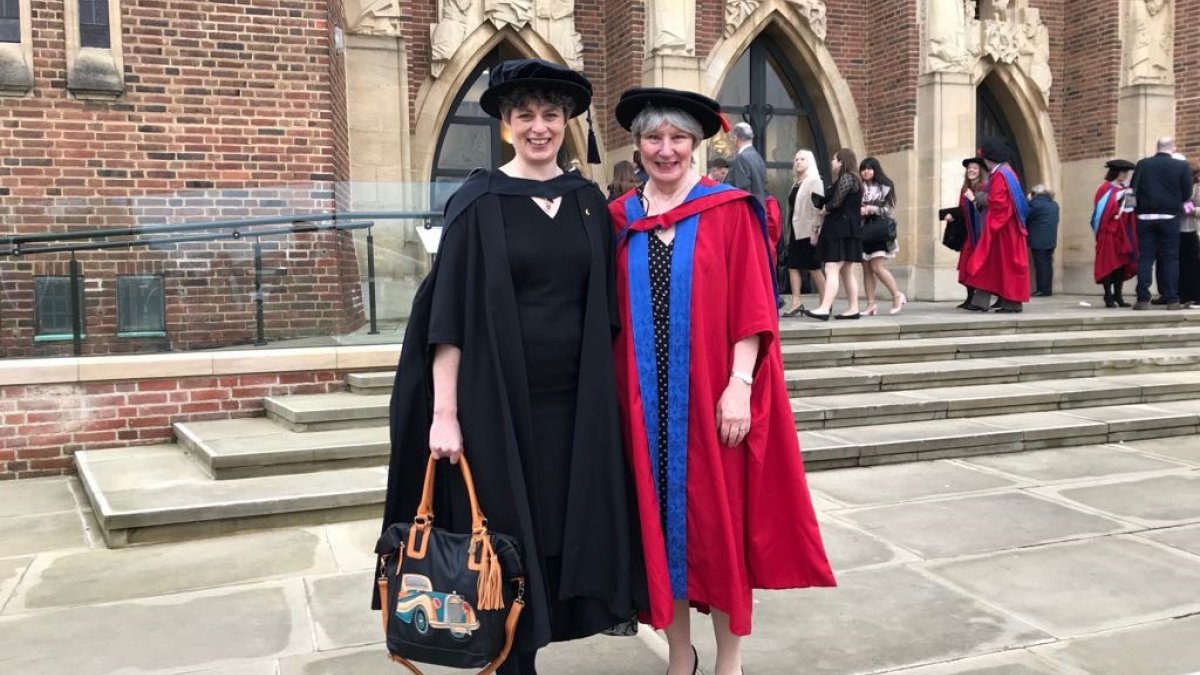Age no barrier to success
Penny Knowler, who has been a pivotal member of Surrey’s Canine Chiari team for over a decade, recently completed her PhD with her thesis on Canine Chiari-like Malformation and syringomyelia supervised by Professor Roberto La Ragione and her daughter Dr Clare Rusbridge.

As a 72-year-old grandmother, who was previously a secondary school science principle, she is proof that success in science can be achieved by those from a wide range of backgrounds. We caught up with her to find out more about her Surrey experience and her fascinating research.
Where did your love of science and nature come from?
I have always loved nature and became fascinated by biology at an early age. I went to an all-girls convent boarding school from the age of seven which didn’t provide the opportunity for science so I was permitted to attend a weekly evening class at the local technical college to study A-level zoology and chemistry. I later graduated in 1967 from Queen Mary College (now Queen Mary University of London) with a Zoology special honours degree.
What made you want to study at the University of Surrey?
On retirement, Clare asked me to help her investigate the genetics for syringomyelia because she thought it was inherited. I became hooked investigating the topic and we started publishing together about 15 years ago. The opportunity to do a PhD came up when she was appointed Reader of Neurology and was offered a sponsorship from the charity Cavalier Matters to investigate Canine Chiari-like Malformation. This was something that I found really challenging but worthwhile because it would help not only animals but human sufferers with the condition.
What was it like to work with your daughter Clare Rusbridge and to be under her guidance?
I have enormous respect for Clare as a scientist and complete confidence in her expertise as a veterinarian. We have developed a good working relationship over the years and share a love of teaching and animal welfare. She is enormously patient with me but quite demanding in an unspoken way. We are both workaholics and usually spend time collaborating during family holidays when it is the only chance we get to see one another as I live in Scotland. Fortunately, our long-suffering family understand our commitment.
The hardest time during the latter part of my PhD was when my husband was diagnosed with terminal pancreatic cancer. Obviously, this was as difficult for Clare as it was for me because he was an outstanding academic in his own right and had supported both of us throughout his life. We are so proud of his bravery and it was wonderful to have him travel with me to my viva and celebrate with us before he died.
What did you enjoy most about your time at the University of Surrey?
Professor Roberto La Ragione took on the onerous task of being my Principal Supervisor. Under his scrupulous management and experience, I was guided through all the administrative hoops of the course with regular telephone conferences. My real worry and stress was living up to everyone’s expectations and coping with the new technology. In the past Clare had played an important role in writing up papers but this was something I had to do as a PhD student. Everyone has been helpful at Surrey – especially the admin team and IT as I am utterly dependent on electronic communication and did not possess a mobile phone in the beginning.
I visited the University on a couple of occasions each year and it was always nice to put faces to the names, go to the market and explore the on-campus facilities. It gave me a real buzz to work in the library and talk with fellow students about the trials and tribulations of writing a thesis or meet up with the staff at Fitzpatrick Referrals with whom I have collaborated.
What next?
I am presenting an oral abstract at the American Congress of Internal Veterinary Medicine (ACIVM) in Seattle this month where Clare is also an invited speaker. I have three papers under peer review at the moment and grant applications underway for further investigations.